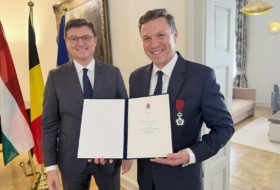Published in the prestigious journal of the Hungarian Historical Society, the article uncovers some little known or previously unknown aspects of Otto von Habsburg’s life, mainly from the period of World War II. Our colleague based his study, among other materials, on the documents in the Archives Diplomatiques de Royaume de Belgique Ministère des Affaires étrangeres (Diplomatic Archives of the Kingdom of Belgium’s Ministry of Foreign Affairs), which sources had not yet been the subject of scientific research.
The exiled Habsburg family lived in Belgium between 1929 and 1940. For seventeen years, the namesake of our Foundation held a travel document issued by this Western European country. Thanks to his Belgian diplomatic passport, he managed to flee to the United States to escape the German offensive and later returned to the European continent in November 1944. The document later caused a major stir overseas, after a member of Congress called for its revocation – as it turned out, mainly at the instigation of the Czechoslovak emigre government in London. The Belgian authorities were uncomfortable with the matter and after the war they opposed the resettlement of Otto von Habsburg in their country, who became a complete stateless person for a short period after his attempt to return to Austria in 1946. Finally, thanks to his extensive network of contacts, he was granted a passport by the Order of Malta and the Principality of Monaco.
The unique approach of the study offers an interesting insight into the years of Otto von Habsburg during the Second World War and the years that followed, and sheds new light on the context of the international relations of the period.
The full article will be available shortly on www.szazadok.hu.


